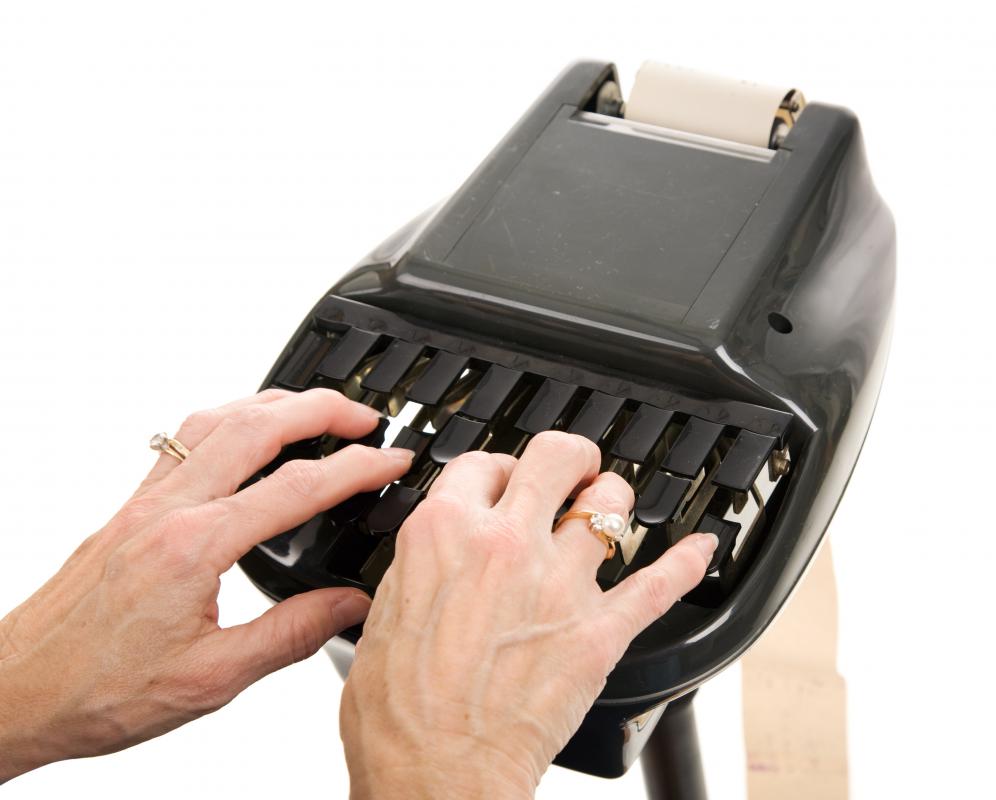At WiseGEEK, we're committed to delivering accurate, trustworthy information. Our expert-authored content is rigorously fact-checked and sourced from credible authorities. Discover how we uphold the highest standards in providing you with reliable knowledge.
What does a Transcriptionist do?
While there is a perception that a transcriptionist is simply a very fast typist, there is much more to the profession. A person who does this job is a working professional who makes good use of language and language arts, research, and an affinity for understanding the meaning and intent behind the words used in a conversation. Along with these qualities, he or she also must possess strong skills at the computer keyboard. With an eye toward accuracy and a commitment to deliver a quality transcript to each customer, a transcriptionist employs a number of talents and skills to get the job done.
Someone who does this job requires the skill of literacy. Because there is the opportunity for just about any word in a given language to be used during the course of a meeting or session that will require transcription, the person must have the ability to transcribe what is heard accurately. This includes understanding colloquialisms that may be employed by various speakers, being able to use punctuation in such a way that the inflection of the speakers are captured as much as possible, and being able to record the dialogue exactly as it occurred. A well-rounded education in the art of language is essential.

Above and beyond basic language skills, the need to deal easily with technical terminology or simple shoptalk is very handy in many transcription jobs. For example, medical transcriptionists need to not only posses a strong medical vocabulary, but also be proficient in the abbreviations that are commonly used with the medical field. This same qualification or skill is necessary for someone who works in a courtroom as well. Understanding the vocabulary well enough to accurately capture the flow of discussion in a document is also very valuable.

Strong typing skills is a must for any transcriptionist. In some cases, the job has to be accomplished in a real time setting, so in effect, this person is taking dictation without the ability to employ the old-fashioned shorthand method. Even in cases where the individual is working off an audio recording of a meeting or event, a quick delivery of the finished transcript may be very important to the client. Circumstances often dictate that a finished transcript be made available to the customer within a day or less, so fast and accurate typing skills go a long way to meeting those sorts of deadlines.

A transcriptionist also may need to employ some research skills to the task. No matter how well versed he or she may be in a given field, chances are that he or she will have to look up a few terms or phrases that are used within a meeting or session. This research often helps the person put the remarks into context, which aids in using appropriate punctuation. The research can also serve to verify the spelling of any words that the individual may be unsure about.
AS FEATURED ON:
AS FEATURED ON:















Discussion Comments
@Mutsy - I think that it would be fascinating to be a legal transcriptionist. You get to hear all of these interesting legal cases and I bet time goes by really fast.
Legal transcriptionists are also called in for depositions not just for trials. I wonder if any of the legal transcriptionists ever thought about writing about some of the cases that they have transcribed. It has to be an interesting job to say the least.
@Suntan12 -I understand what you mean. There is a distinct learning curve with the transcriptionist job and many employers cannot afford for someone to make a mistake with respect to someone’s medical records or legal case.
I guess that is probably why they will not hire you to work at home until you have a track record. At least on the job, you can be coached and mistakes can be corrected quickly, but at home that is harder to do.
I looked into the field myself because the medical transcriptionist salary was over $35,000 a year and I thought it was a good salary. I think the legal transcriptionist make closer to $50,000 a year.
@Anon134155 -Wow I didn’t know that the transcription job could lead to e-book transcription, but it does make sense.
I always thought that transcriptionist training involved medical or legal transcription. I looked into the field a while back and it did sound like a promising field.
I was considering medical transcription because I know that people do have the ability to do this job from home and I needed an at home job. The only problem is that once you complete your training and try to get a job, most hospitals or doctor’s offices will not hire you to work at home.
You really need at least three years of actual working experience in the field in order to be able to find jobs that allow you to work from home, so this would not work for me.
Just to add to the above definition we also take an audio (MP3, WAV, CD or other audio format) and put it into a working document (Microsoft Word, e.g.). Then the document can be emailed to the client or uploaded onto an FTP.
Some of the uses of transcriptions can be an ebook, an added bonus for seminar attendees, marketing purposes, etc.
Post your comments